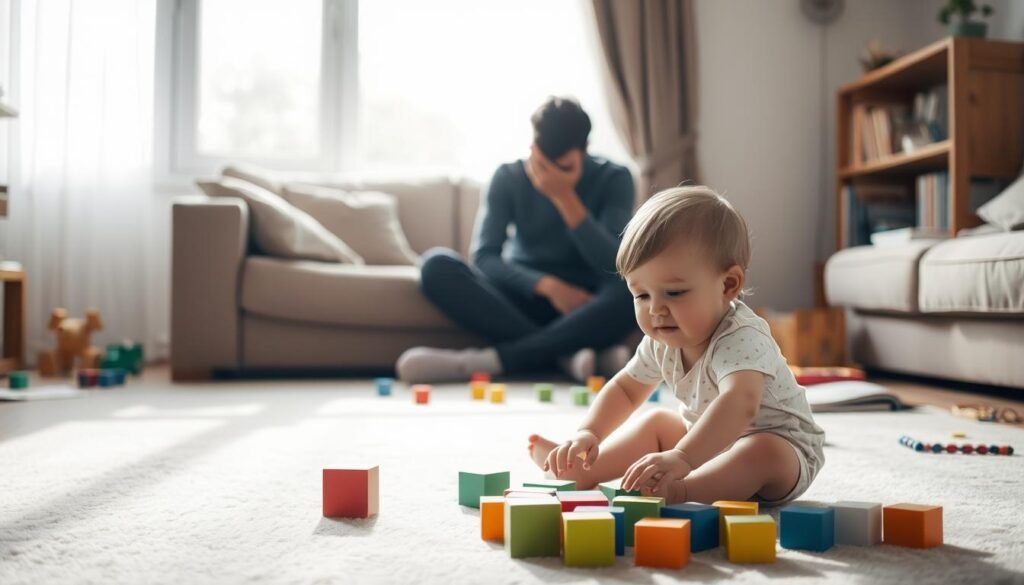Between 10% and 15% of new mothers worldwide feel postpartum depression. It impacts their emotions and how they connect with their baby. Often, it starts in the weeks after giving birth. Sometimes, it appears up to a year later. This issue is more than personal—it affects the baby’s growth and the mother’s connection with the child. Knowing what leads to postpartum depression is key for preventing it and helping early on.
Young moms, aged 18 to 24, face postpartum depression the most, with rates at 10%. As women get older, the risk goes down. For those between 35 and 39, it falls to 6.5%. But for moms over 40, it slightly rises again. Also, moms having twins report more depression. This highlights how important it is to support them specifically.
It’s crucial to pay attention to mental health after having a baby. If these risks aren’t handled, it can harm both the parent and child for a long time. Understanding these challenges helps guide new parents to better health after birth.
Key Takeaways
- 10% to 15% of new mothers experience postpartum depression globally.
- Young mothers aged 18 to 24 report the highest incidence of symptoms.
- Mothers of twins have a significantly increased risk of postpartum depression.
- Addressing risk factors can facilitate early intervention and support.
- Understanding postpartum mental health is vital for both parents and child development.
- Effective postpartum depression prevention strategies can improve family dynamics.
Understanding Postpartum Depression
Postpartum depression (PPD) is a serious mood disorder that appears after childbirth. It affects a lot of new parents. This condition is more than just the “baby blues,” which up to 85% of women feel briefly after giving birth. Globally, 10% to 15% of new moms experience PPD, showing how widespread it is.
It usually starts within the first month or two after delivery. But it can develop up to a year later. Spotting the signs early on is key to getting help.
To really understand PPD, we must pay attention to how its symptoms change over time. A lot of women feel emotionally upset, but not all get the help they need. If not addressed, PPD can interfere with mother-baby bonding. It’s crucial to consider how emotional and hormonal shifts after birth play a role.
Many factors can lead to PPD. These include changes in hormones, past mental health issues, and the stress of looking after a baby. Some groups of women have a higher risk. About 30% struggle with depressive symptoms well beyond the first few months. This shows why it’s important to understand PPD and its effects on moms and babies. Learn more about postpartum depression.
Without treatment, PPD can last a long time. This can hurt both the mom’s health and her baby’s development. Being aware and seeking help is crucial for recovery. This helps improve the mental health of new moms.
Symptoms of Postpartum Depression
It’s crucial to know the signs of postpartum depression for the health of the parent and baby. Many experience pervasive sadness, anxiety, and mood swings. This can make new parents feel exhausted. It affects their daily life and ability to care for the child.
About 80 percent of new parents get the “baby blues” after childbirth. This is a short-term emotional state that lasts from a few days to two weeks. While many get better on their own, knowing the symptoms is essential. It helps in spotting more serious mental health issues early on.
Postpartum depression can take different forms, like anxiety or OCD. In rare cases, postpartum psychosis happens, typically in the first week after birth. Symptoms usually start within a few weeks after having the baby. But, they can also occur during pregnancy or up to a year later.
Unaddressed postpartum depression affects not just the parent but the child too. Kids of depressed moms may face more emotional and behavior issues. Problems like poor bonding, challenges in breastfeeding, and a higher risk of suicide can occur. Fast recognition and treatment are vital for dealing with postpartum mental health.
| Symptom | Description |
|---|---|
| Pervasive Sadness | Feeling persistently low or hopeless |
| Anxiety | Constant worry about the baby’s well-being or doubting one’s ability as a parent |
| Mood Swings | Rapid changes in mood, from happiness to sudden sadness |
| Excessive Fatigue | Feeling so tired that it’s hard to do daily tasks |
| Difficulty Bonding | Struggling to feel a connection with the newborn |
What Causes Postpartum Depression?
The causes of postpartum depression are complex. They may include hormonal changes after childbirth, stress, and changes in family life. Nearly 80% of new parents feel depressed, anxious, or irritable soon after their child’s birth.
Sleep loss can make these feelings worse, leading to a cycle of tiredness and low mood. People with a history of mood disorders are more at risk. Between 6.5% and 20% of new parents show depression signs, while about 10% face postpartum anxiety.
Lack of social support or marital problems can make one feel alone and sad. Pregnancy or delivery problems also add to the risk. Those unsure about their pregnancy or from marginalized communities often have higher depression rates.
For more information on postpartum mental health, visit March of Dimes. Early detection and treatment are key to managing these issues. This allows for personalized care and support.
The Importance of Maternal Mental Health
Maternal mental health is key for mothers and their kids. Studies show that 10-20% of moms face postpartum depression (PPD). This is a big concern for public health. If not treated, PPD can harm the critical bond between mother and child. Taking care of mental health issues early can help children thrive.
Having a history of depression can increase the risk of PPD. This is due to genetic factors. Also, hormone changes after giving birth can lead to mental health challenges. The support a woman has can greatly influence her mental health. Without enough support, her risks can go up.
Many women go through postpartum blues, which is brief. However, up to 85% of new moms experience it. Postpartum depression is more serious and lasts longer. It often needs professional help. By focusing on prevention, we can create a supportive setting. This helps both mom and child.
Risk Factors for Postpartum Depression in New Parents
It’s key to know the risk factors for postpartum depression in new parents. They need early help. Mental health history, social life, money issues, and pregnancy problems play a role.
Previous History of Mental Illness
Mental illness history can make postpartum depression more likely. If a woman has faced depression or anxiety before, her risk goes up. Knowing this, it’s vital to watch these women closely after they give birth.
Social Support Systems
Having support is super important. Emotional and practical help is needed for new parents. Without a strong network, the chance of getting postpartum depression goes up. Staying connected with loved ones can fight off loneliness and the stress of being new parents.
Socioeconomic Status
Money matters too. Being in a tough financial spot makes things harder, adding stress after having a baby. Research shows that being poor can raise the risk of postpartum depression.
Pregnancy Complications
Problems during pregnancy are another risk factor. Things like gestational diabetes or a hard birth impact moms’ health. They can lead to postpartum depression. Understanding these issues helps in supporting new parents through tough times.
| Risk Factor | Description |
|---|---|
| Previous Mental Illness | History of depression or anxiety can heighten risk. |
| Social Support | A strong network reduces feelings of isolation. |
| Socioeconomic Status | Financial stressors can exacerbate mental health challenges. |
| Pregnancy Complications | Health issues during pregnancy contribute to emotional strain. |
For more insights about the causes of postpartum depression, visit this resource.
Paternal Postpartum Depression
Paternal postpartum depression is a major mental health issue for new dads. It’s less talked about compared to mothers, but 8-13% of dads might experience it. It’s key to notice the signs so they can get the help they need during this big change.
Signs and Symptoms in Fathers
Fathers can show different signs of depression. Look out for these common ones:
- Irritability and a rise in frustration
- Emotional withdrawal from loved ones
- Fatigue that’s more than just being tired
- Difficulty concentrating on everyday tasks
- Changes in appetite or sleeping habits
It’s easy to miss paternal depression. Knowing these signs helps families step in and offer support.
Unique Risk Factors for Dads
Dads face unique challenges when becoming parents. These include:
- Their partner’s mental health
- Money worries or work issues
- Lack of friends’ support
- High self-expectations as new fathers
These issues can make becoming a dad harder. Knowing these can lead to early action and open talks about mental well-being.

The Role of Hormones in Postpartum Depression
Hormones greatly affect how new moms feel emotionally after giving birth. When levels of estrogen and progesterone drop quickly, it can make regulating mood tough. This leads to symptoms of depression. Knowing about these hormonal shifts is key to help those facing postpartum depression.
About 13% of pregnant women deal with depression. Nearly one in four women undergo a severe depressive episode after giving birth. These numbers show how linked hormones and mental health are for new moms. Up to 80% of them feel the “baby blues” soon after their baby is born.
Studies have linked changes in hormones to mental health. Research found that shifts in certain hormones after birth affect mental well-being. Problems with thyroid hormones can also affect the mom and baby, making things harder.
It’s critical to spot these hormonal effects early on. Stress impacts hormone levels too. Higher stress can lead to problems for the baby. Handling these issues is crucial in fighting postpartum depression.
To better understand, studies are looking into new ways to spot mood changes in postpartum depression. They’re studying certain hormones in the blood to find clues about mood shifts. This research helps us grasp how hormones tie into these mood changes.
For more on what causes postpartum depression, check out this resource.
Preventing Postpartum Depression
Preventing postpartum depression starts early, during pregnancy. Talking about mental health in prenatal care raises awareness of what new parents might face. Screenings can identify those at higher risk early on, helping in risk reduction.
Having a strong network is key for family resilience. Support groups let new parents meet, share, and understand each other. This can lessen the loneliness that may lead to depression.
About 20% of new mothers in the U.S. face depression after childbirth. This fact shows why we need to act early, focusing on mental health even before the baby arrives.
Telling expecting parents about depression’s signs and symptoms helps a lot. This knowledge is a powerful part of postpartum depression prevention. It helps people spot changes in themselves or their partners quickly.
Healthy living strategies are crucial too. Eating right and exercising affect a person’s mental health. By looking after their well-being, new parents can fight off depression.

Seeking Professional Help and Treatment Options
It’s crucial to get professional help for postpartum depression. About 13% of mothers face this, but not all seek help. Many treatment options have good results. For example, Cognitive behavioral therapy (CBT) helps one in three moms.
Many women don’t seek help because they feel ashamed or scared. Almost 40% stay away due to these feelings. Shame is even more common among Asian/Pacific Islander women. White mothers often get better care than African American moms. Fear about losing custody of their child also stops many from seeking help.
Treatment options for postpartum depression are diverse and include:
- Psychotherapy (e.g., CBT)
- Medication
- Support groups (both online and in-person)
- Lifestyle modifications
It’s important to talk openly about mental health. This can reduce stigma and promote support. Postpartum depression doesn’t only affect moms; dads can get it too. Roughly 1 in 10 new fathers experience depression. By recognizing and tackling these issues, recovery speeds up. This makes bonding stronger for the entire family.
| Treatment Options | Effectiveness | Accessibility |
|---|---|---|
| Cognitive Behavioral Therapy (CBT) | ~33% success rate | In-person & online |
| Medication | Varies based on individual | Prescription required |
| Support Groups | Variable, peer-led | Community & online |
| Lifestyle Modifications | Depends on consistency | Self-directed |
Impact of Postpartum Depression on Child Development
About 13% of new moms go through postpartum depression. This health issue can change a child’s ability to think, feel, and connect with others. Kids with moms facing this depression may struggle to focus and get easily upset. This introduces early challenges in their life.
Depressed moms might not respond as much to their kids. This lessened interaction can harm the kids’ emotional and mental growth. Studies show that a mom’s mental well-being greatly affects her child’s growth. Such children may face troubles adapting, showing more internal and external issues at school.
If postpartum depression is not addressed, it can harm children long-term. They might struggle more with learning and controlling their behavior. As these kids grow, they face higher chances of emotional issues and risky behaviors. Paying attention to a mom’s mental health early can lead to better family life and child development.
| Impact Areas | Children of Depressed Mothers | Children of Non-Depressed Mothers |
|---|---|---|
| Cognitive Development | Impaired cognitive functioning | Normal cognitive functioning |
| Behavioral Issues | Higher rates of violent behavior | Lower rates of behavioral problems |
| Emotional Development | Emotional maladjustment | Healthy emotional regulation |
| Adaptive Functioning | Impaired adaptive skills | Normal adaptive functioning |

Conclusion
Postpartum depression is a tough issue that needs careful attention and action. It’s very common in women who have had mental health issues before, with a risk as high as 21.03. Other factors like being older, having gestational diabetes, and delivery problems also increase the risk. Knowing about these risks is key as they deeply affect new parents’ lives.
Supporting moms’ mental health is critical for them and their kids’ future. About 13% of new parents might face depression. This can negatively impact how they raise their kids and their children’s growth. Spotting and helping early can improve family life and help build strong bonds between parents and kids.
In brief, we must all support and provide resources to understand postpartum depression better. By focusing on prevention, learning, and talking openly, we can lower risks and boost mental health during this vital time. This shows how important it is to focus on maternal mental health for better futures.